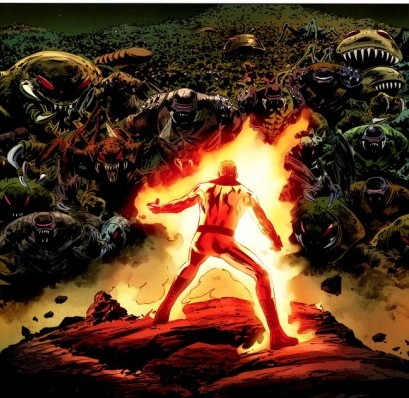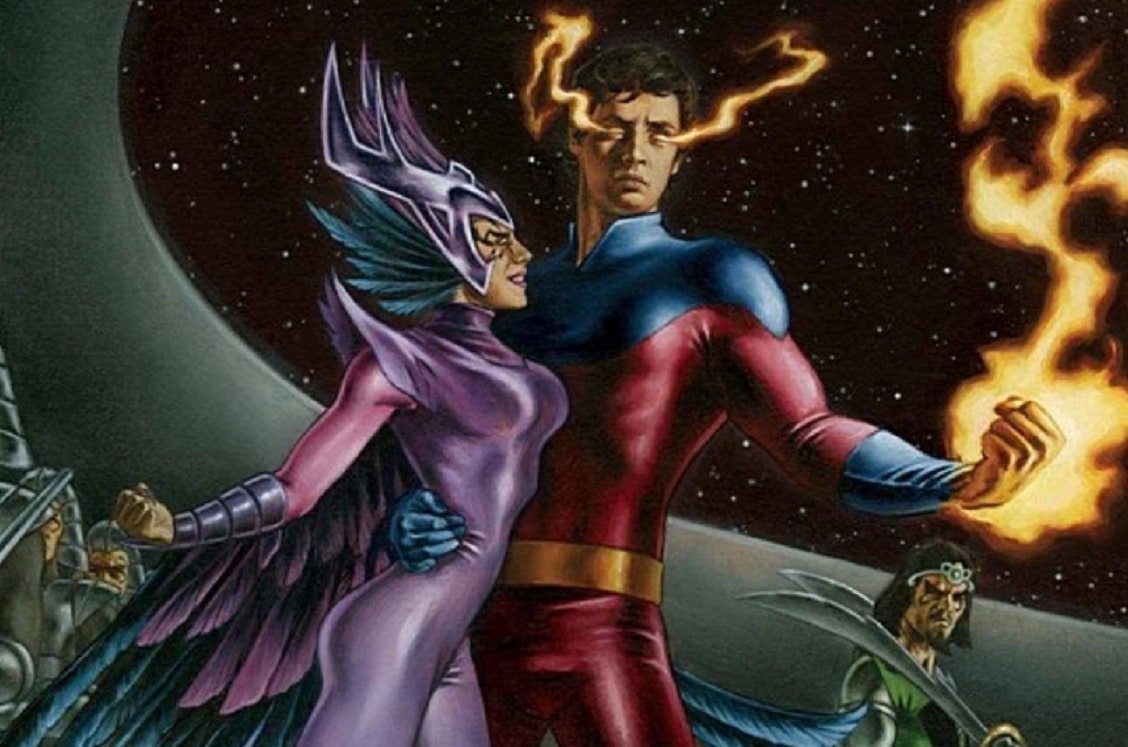Okay, so a member of the Fantastic Four died in FF #587 — a comic which would normally be on sale tomorrow, Wednesday, like usual, but went on sale early at selected retailers. At the same time, a story hit the wires, NPR and just about every other media outlet with a “DEATH IN THE FAMILY” type story, effectively spoiling what had been a pretty well kept secret until then. Twitter was fluttering from the moment the stories hit. Whether you were outraged or shrugged your shoulders at the spoilage it was yet another example of a Big Two publisher planting a major media story and having no good option for timing. This also happened, famously, with the death of Captain America, the death of Batman, and surely many other stories we are too jaded to remember.
Despite the many cries for more regular media coverage of comics to get new people thinking about buying comics, no one is ever completely happy with this. For years, Marvel’s David Gabriel has been appearing on retailer message boards begging them to heed his mysterious warnings that “This issue will be one people are talking about!” To give credit where due, Marvel and DC are both very good about getting these stories in the Times or USA Today or somewhere where they are likely to get picked up — so when they say they are going to do it, they are right. The timing of the Torch — OOPS! — announcement was tied in to the Tuesday delivery — critics say it could have been on Wednesday and civilians wouldn’t know the difference. but when is the good time/ If you announce these things ahead of time, the books aren’t available then. If you let it leak, the major media won’t run the story because it isn’t exclusive any more. If you can’t say what exactly it is, why should retailers order enough for the demand?
This time out, Marvel certainly did a good job of letting people know SOMEONE was going to die, and everyone played along with not letting the secret out. The industry is more interested in selling comics than playing “I know something you don’t!” these days. While FF #587 didn’t get the massive civilian invasion of the Death of Cap or Obama meets Spidey, there were people coming into stores around the nation looking to buy just that issue, according to retailer reports. There really is no perfect way to handle these things, it seems. One thing’s for sure — as long as a death causes this much hullabaloo, publishers are going to keep doing it.
Elsewhere, if you want to read the scene in question, David Brothers posts it.David Uzumeri explains why it had to be Johnny. Laura Hudson smartly interviews the smart Jonathan Hickman about how the story came about, spoilers and more:
CA: I think it’s been an interesting reflection of how spoilers function right now in comics culture. There’s a lot of nostalgia about the days when people only learned about deaths and plot twists when they read the book, but with the internet it’s really hard to have that experience and to prevent information from getting out. Do you think the culture of spoilers is fundamentally changed in comics, that it can never be that way again?
JH: It is my belief that if you want something to be a surprise you have to tell no one. And you have to get them on the first day. Other than that, it’s only a true surprise — the ending of a movie is only a true surprise if you tell someone, don’t market it, and see it on opening night. Otherwise, the chances of it being ruined for you grow exponentially every day. We just have to accept that this is the world that we live in, and stop writing stories that are only about reveals, and make them more about stories that unfold. Which is why I’m OK with people knowing that a character dies. And I’m OK with them knowing who it is now, because we’re not done. It’s part of the journey and the greater story. I’d like to think that I’m embracing the way you have to tell stories nowadays rather than trying to desperately hold on to what I consider to be an outdated mode of storytelling.
In the sardonic corner, Graeme McMillan suggests other characters who might profitably be slain. Our own suggestion? The Spectre. That would really be ironic.
Speaking of grisly, MTV Geek caught up with Stan Lee to see what he had to say about it, and it’s not what you expected:
“I’m too shook up about it to make a comment,” Stan said with a laugh.







“I’d like to think that I’m embracing the way you have to tell stories nowadays rather than trying to desperately hold on to what I consider to be an outdated mode of storytelling.”
I’m not sure that it’s an outdated mode of storytelling. If you don’t announce that someone will die, it would come as a shock. Print up extra copies in anticipation of people wanting the issue later on.
Besides, when there’s only four people in the team, odds are pretty good that you’ll guess the target.
Ha, that Stan quote made my day
I think that the young comics crowd (or entertainment crowd) expects spoilers. I think it has become part of their feeding frenzy. It’s a bigger version of Facebook: “Where is Joe? Oh, he’s at Starbuck’s. I knew that first.” So if you don’t know a spoiler, you are not being a good enough geek. It’s very hard to put into words, but I see it all the time: people blurting out spoilers almost just for attention. And because comics have become these big movie media juggernauts, knowing a spoiler might be the only way a geek can show off his or her connection to the material — because it has been taken from them. Does that make sense?
What I don’t get is why all of us seasoned readers get so surprised. Of course this won’t last, but who cares? That’s why super-heroes exist, right? In both a commercial and psychological sense. But though this is commercial, at least Hickman seems intent on sticking with the characters to tell a long, dramatic, hopefully good story. That is why this one *might* be different.
And if you have doubts, read his FF: it’s very good.
Brad
If you look in the right place, you can find the Usenet rec.arts.comics threads discussing the monthly issues of Watchmen as they hit the stands, and the various speculations over who the murderer was. Watchmen is still a good read, because the story is structured so tightly.
Sometimes the mystery is not oblique enough, and the fans figure it out before the reveal (DC’s Armageddon 2001). Or the reveal plays a trick, like The Big Man in Amazing Spider-Man.
The whole purpose of using such an “event strategy” is to artificially spike the sales of a book.
If the publisher gives no hints in advance that an (often trumped-up) event is about to take place, there will be no extra advance orders, defeating the whole purpose of such an event in the first place.
It’s a carrot-and-a-stick approach that seems to me to be a desperate attempt to make up for the fact that the publisher’s normal stories just aren’t bringing in the customers.
Which makes this former Marvel Zombie ask: Is The House of Ideas so empty now that it feels that the only way to increase sales is to resort to “geek show” tactics?
Elton John will be singing “Candle in the Wind” at his funeral.
But Marvel did give advance public notice (unlike Captain America #25)! The story arc was titled “Three”. There was a banner at the top of each issue noting “Countdown to Casualty”.
If done correctly, this type of story can bring in new customers who now want to read the previous issues by the author. I haven’t read this arc, but there were previous issues by Hickman which I enjoyed, and given the big ideas he’s featured in the the series so far (Nu-Earth, Nathaniel Richard’s Battle Royale), I will be buying the trades.
Ian, I think Iron Mask singing “My Eternal Flame” would be more apropos.
I couldn’t help but wonder if I hadn’t seen this death scene play out before at the end of Star Trek II: Wrath of Khan.
~
Coat
Made it halfway through Wednesday without getting spoiled. Then I saw the image accompanying this piece. Very lame The Beat.
The issue was fantastic by the way.
Let’s see:
#587 — Human Torch Dies. Then there’s, say, y’know, 12 issues of “sequel” series FF. Then, the 13th issue after Johnny’s death, wherein Johnny is restored to life via Franklin Ex Machina, is the reversion of FF to its original title and numbering with Fantastic Four #600.
yawn!